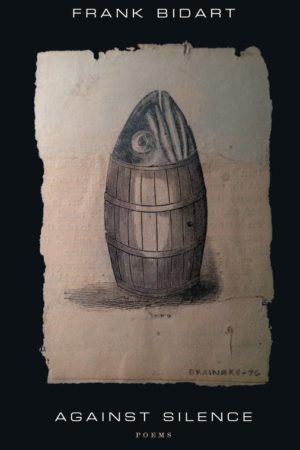Against Silence
by Frank Bidart
reviewed by William Doreski
“To further the history of the S P I R I T is our work,” observes Frank Bidart’s persona in “Mourning What We Thought We Were.” In Bidart’s newest collection, Against Silence, the history of the spirit is as much the individual story of the self, as seen in particular landscapes, as it is a larger story of general demise. This new book is elegiac, lamenting the poet’s old age, America, and the dying natural world. He goes on to argue:
Every serious work of art about America has the same
theme: Americais a great IDEA: the reality leaves something to be desired.
Poems looking back on Bidart’s childhood in California note the racial and ethnic prejudice earlier generations voiced openly. Even in childhood, he notices the exploitation of California’s fragile landscape: “we have succeeded at last in killing NATURE” (“At the Shore”). Alter egos blurt out rhetorical proclamations like this one, but then the voice modulates to something more conversational, more personal. It’s a voice Bidart first developed in his early poem, “California Plush”—the poet is speaking for himself, as himself, in the self-effacing tones his friends recognize from casual conversation.
This temperate voice recurs throughout Bidart’s work. Usually it’s in dialogue with the poet’s past, specifically the landscapes of Bakersfield and the Mojave Desert. That dialogue continues in the present collection, in Bidart’s unique style: words are capitalized for emphasis and italicized for sotto voce and digressions; punctuation is individualized and sometimes weaponized. Some readers have found this aspect of his poetry distracting: reading a Bidart poem aloud, while trying to follow its cues, can be a challenge. Bidart has gradually become less dependent on this technique; the longer poems or sequences in Against Silence pose few such typographic or punctuational challenges. Still, Bidart’s method of combining lyric compression and contingency with an essentially dramatic structure is at the heart of his poetics.
This dramatic approach allows Bidart to risk making bald statements that, on their own, might embarrass the reader, but which are often sieved through remarkable metaphors. Take his definition of poetry in the third section of “The Fifth Hour of the Night”:
poetry. Dark anti-matter whose matter is
words
in which the seam and the crack (what Emerson
called the crack in everything God made) are in
fury
fused, annealed, ONE.
This long poem about Bidart’s harsh childhood and early adulthood deals with the terror and emotional blackmail inflicted on him by his benighted family. Much of the poem consists of aphoristic, three-line units that, in their self-containment, function like heroic couplets:
The rage I felt at what she demanded did not
preclude
my furious but supine eventual acquiescence.
The fragmented quality of much of Bidart’s verse derives from the compaction and finality of such stanzas. The spaces between them allow readers to catch their breath and prepare for the next emotional onslaught. Even those that are grammatically linked stand, momentarily, alone, separated by elbow-sharp enjambments. Memory comes in individual packets, each one to be unsealed, examined, and suffered through all over again.
This collection is as much about mortality as it is about memory. “Why the Dead Cannot Answer,” the book’s opening dirge, expresses the fear of absolute extinction familiar to those of us approaching the ends of our lives:
A light, just now living, that has
never been, in its mortal life, turned off—ON, it has never been, in its mortal
life, not ON,—
The fear of the dark, embodied by the light switch, permeates Bidart’s work, from 1990’s In the Western Night, through his long sequence on the hours of the night, and the poem “Dark Night” (after St. John of the Cross). The title of his 2016 collected poems, Half-Light, indicates a partial reckoning with mortality—but only partial, as the final poem in Against Silence once again demonstrates. “On My Seventy-Eighth” finds the speaker seated alone, paradoxically, with his dead self or double. He cannot make peace with this self—its place at the table is empty, and nothing can change that.
While the poems in this collection revisit Bidart’s familiar themes of sex, spirituality, strained family relations and personal inadequacies, framing them as he does with poems of mortal dread forces us to read them afresh: the family poems (“Dialogue with Flesh”) read like final accountings; poems of lust and longing (“Poem Beginning with Lines by Lisel Mueller”) seem more poignant. Bidart, like all strong poets, is continually reinventing and rediscovering himself; even at the brink of dissolution he refuses to be silent.
Published on January 25, 2022

